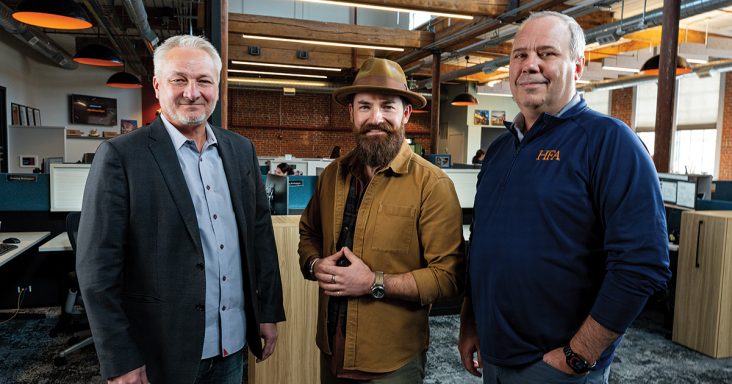HFA grows rapidly following leadership change, culture shift
by March 3, 2025 10:18 am 1,673 views

(from left) HFA CEO Dave Wilgus, Chief Strategy Officer Cannon McNair, and Chief Operating Officer Ryan Ray
Bentonville-based architecture and engineering firm HFA has added more than 110 employees in the past year. Chief Strategy Officer Cannon McNair attributed the growth to multiple factors, including a culture shift, harnessing the firm’s strengths, and how the firm supports its clients.
The growth phase began after a leadership change in 2019 when the company was known as Harrison French & Associates. That year, Dave Wilgus was promoted to CEO, Ryan Ray was named chief operating officer and company founder Harrison French assumed the role of chairman. It was also the year McNair joined the company full-time after helping to develop HFA’s marketing program as a consultant. McNair was recently promoted to chief strategy officer.
“We kind of set on a whole new path,” he said. “We had been given a strong foundation to grow upon by the original founders, but around 2019, we started … investing further in our people.”
He said the COVID-19 pandemic happened the following year, but “we weathered that really well.” HFA was “ready overnight to go virtual because of the technology frameworks we had put in place for many years leading up to that point, and we still have everyone in our entire enterprise connected virtually with centralized servers in Bentonville.”
McNair said HFA has adopted a “work-life balance” culture and has hired people across more than 30 states. The company has about 450 staff.
‘THINK LIKE A STARTUP’
In 2019, he said HFA worked with Startup Junkie, which he’d leveraged with his entrepreneurial background.
“I challenged our C-suite at the time for us to think like a startup,” McNair said. “That sort of mental shift as well kind of set us on a new path for growth. Since then, it’s kind of come to fruition. Today, part of my job and our job in general is we’re trying to manage that growth. We have a harder time finding people to fill and help us deliver projects than we do with the market. The market has been quite vibrant for us.

“We try to source high-quality, talented people. Oftentimes, they find us. Sometimes we find them. We have found that if we find quality people with networks and amazing portfolios, that is our best bet … on how we can grow in that area.”
Those areas driving the firm’s growth include health care, hospitality, industrial and retail.
“Over the last couple of years, we’ve been investing in health care but haven’t taken on a lot of projects. Right now, we’re in the middle of starting to onboard some high-quality clients,” said McNair, adding that the company has nondisclosure agreements with them and cannot name the clients.
“We’re active all over the country,” said McNair, speaking from the firm’s Boston area office. “Especially here in New England, it’s such a healthy health care market that we see a lot of growth here.”
He said the health care sector “is positioned for the biggest opportunities in growth” and that its growth may outpace that of its other sectors in five years, comprising up to 20% of its business.
HFA has a health care-focused team of architects and engineers discussing health care-related projects in Northwest Arkansas and New England. He said New England has been the company’s fastest-growing region and a focus. Projects include mixed-use, multifamily, industrial, retail, hospitality, and health care.
Within three to five years, McNair expects the company to exceed $100 million in net revenue, adopt technology more rapidly, and better understand how artificial intelligence will affect the architecture and engineering industry and make it more efficient.
The company’s net revenue was about $65 million or about $74 million in gross revenue in 2024. Net revenue was up about 16% from 2023, and McNair’s targeting a 20% growth rate and noted that 15% is healthy growth. He said the company uses net revenue because of the large amount of consultant and reimbursable fees in the industry.
SINGLE ACQUISITION
Some firms grow through acquisitions, but McNair said the company, which is in its 35th year, has only acquired one firm. About a decade ago, they acquired a small firm near Boston.
“There’s something about New England,” he said. “There’s so much density and so much growth … They’re always innovating here. There’s a lot to learn and a lot of really talented people … We’re currently in the process of deeply analyzing what our next regions are. We’re still looking along the East Coast, maybe down into central Florida, and of course, Northwest Arkansas is now on our radar heavily … We’ve got big players coming in our backyard … 10 years ago, people didn’t know where Bentonville was, and now we’re on the map.”
HFA has worked on notable area projects, including Ledger and Best Friends Pet Resource Center in Bentonville. Nationwide, some of its largest projects have included over 1 million square feet of industrial space, such as robotics-operated facilities. He said many of these large projects include nondisclosure agreements with clients.
Excluding industrial, some of the most complex projects comprise entertainment venues. Complex health care projects are in the works in the Boston area.
While the company has made only one acquisition, he didn’t rule out this for the future.
“We’ve grown through aligning ourselves with experts,” McNair said.
The company rehired Nicole Poole, who was looking to move back to Northwest Arkansas from Chicago, after she reached out and “brought an amazing portfolio,” McNair said.
“Since then, we’ve onboarded a whole new team around her — just an incredible portfolio of projects. We’re doing the same thing with health care right now.”
He said Poole, who designed Topgolf entertainment venues at another firm, is leading the design for Zion Canyon Hot Springs resort near Zion National Park in Utah.
“They’re piping hot springs out of the canyon in this area that was inaccessible … And they’re piping this up into a more accessible place and then creating this whole hot springs pool concept,” McNair said. “It’s a beautiful project.”
The company has also completed a hot springs project in the Dallas area. Another entertainment-related project was for batting cage venue Home Run Dugout in Katy, Texas.
FASTEST GROWING SECTOR
HFA’s work in the hospitality sector has grown to include quick-service and fast-casual restaurants and fine-dining establishments. Chick-fil-A is a client. McNair said the company is known for its retail work, but the hospitality sector is its fastest growing.
“Walmart has been one of our largest accounts for about 30 years, and they have steadily grown,” he said. “And as we have grown, Walmart has grown along with us.”
HFA handles Walmart distribution center projects as well as 1-million-square-foot manufacturing and storage facilities.
About 200 of its employees work in Northwest Arkansas, about 50 in New England, about 30 in Fort Worth, Texas. Combined, about 300 employees work near an HFA studio. He estimated that up to 200 employees work remotely.
“We’ve coined the phrase ‘work from anywhere,’ and it’s changed our culture,” he said. “Even for myself — I’m within 45 minutes of our Bentonville studio, but I work from home most days. It’s not too uncommon for me to take a meeting from my vehicle or a coffee shop, and that’s the case for almost anyone. And we’ve grown that way.”
He said the company has about 40 staff working remotely throughout Mexico and has a Mexico City studio. HFA’s other studios are in Franklin, Mass., Fort Worth, and Springfield, Mo., which opened in November.
“We’ve just learned how to do it as an architecture and engineering firm,” he said. “I think a lot of firms like ours have not learned how to do that. They are trying to return to something … We’ve never even used the language of return. We’re like, “Return to what?’ We leaned in, so we just grew. We’ve got people everywhere now.”
He said many people have come to HFA because they were at another firm “trying to go backward, or they weren’t evolving … Culture has been the thing driving our growth. It’s how we treat our people.”
McNair said the company became 100% employee-owned in 2022. As an Employee Stock Ownership Plan (ESOP) company, “we have built an environment where everyone is able to thrive.”
